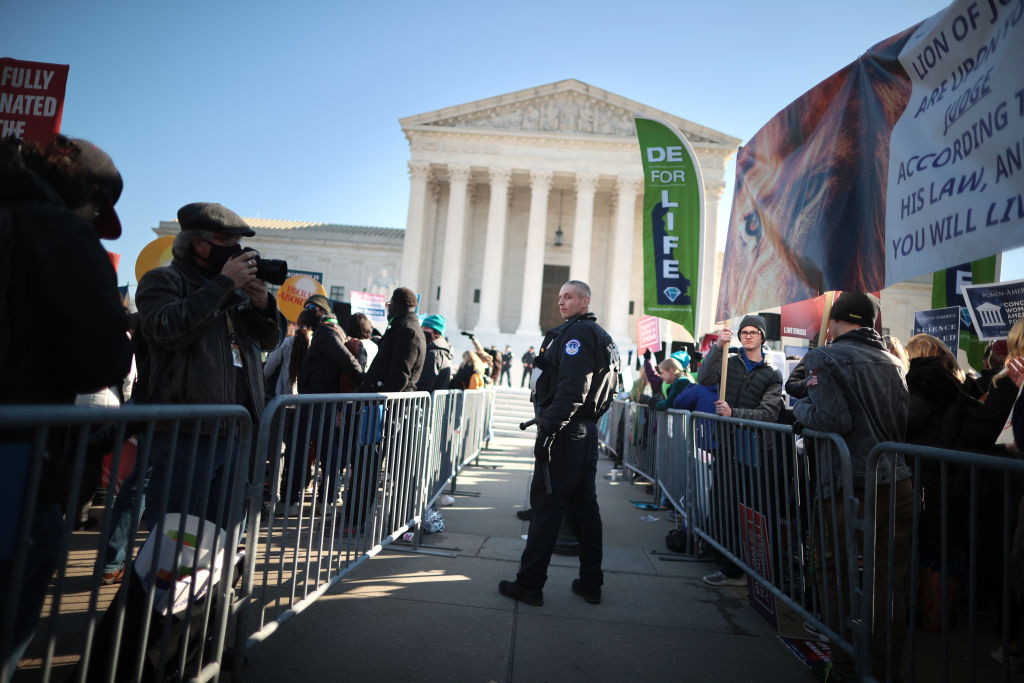On Wednesday, the Supreme Court heard oral arguments in the case that could potentially overturn Roe v. Wade.
Mississippi law bans nearly all abortions after 15 weeks of pregnancy, and the case heard today, Dobbs v. Jackson Women’s Health Organization, challenges that law.
The oral arguments started at 10 a.m. eastern time, and now there are reports saying that the Court seems to be poised to uphold the Mississippi law.
In abortion cases, the Court’s main precedent is Roe v. Wade and Planned Parenthood v. Casey, which say that women have the right to an abortion up to about 24 weeks of pregnancy.
After 24 weeks, a fetus is typically considered viable (able to survive outside the womb), so it is no longer able to be aborted.
On behalf of the state of Mississippi, the state’s solicitor general, Scott Stewart, argued that there are other good alternatives to abortion, such as safe haven laws, that still allow parents to forfeit child responsibility, Axios reported.
Julie Rikelman argued on behalf of Jackson Women’s Health Organization, which is the last abortion clinic in Mississippi. Rikelman is the senior director at the Center for Reproductive Rights.
The justices asked Rikelman about viability.
“Why would 15 weeks be an inappropriate line? Viability, it seems to me, doesn’t have anything to do with choice, but if it really is an issue about choice, why is 15 weeks not enough time?” Chief Justice John Roberts asked, according to NPR.
“If the Court were to move the line substantially backwards — and 15 weeks is nine weeks before viability, your honor — it may need to reconsider the rules around regulations because if it’s cutting the time period to obtain an abortion roughly in half, then those barriers are going to be much more important,” Rikelman answered.
The Supreme Court already leans conservative after former President Donald Trump nominated three new justices during his presidency. The Court is now balanced six to three in favor of conservatives.
According to NPR’s reporting, at least the three newest justices — Neil Gorsuch, Brett Kavanaugh and Amy Coney Barrett — already appear to be leaning toward upholding the Mississippi law.
Justice Clarence Thomas is also expected to side with the Mississippi law, particularly due to his opinion during Casey, SCOTUS Blog reported.
Thomas is the only current justice who was also on the Court during Casey and he joined the opinion of previous Chief Justice William Rehnquist saying, “Roe was wrongly decided, and that it can and should be overruled.”
However, Mississippi is specifically seeking for the Court to overturn Roe v. Wade. While the justices seemed in favor of upholding the law, there still seemed to be a disagreement on the Court over whether to formally overturn the precedents.
“But the justices were once again deeply divided over whether to formally overturn those precedents, as Mississippi and its supporters are seeking,” SCOTUS Blog reported.
But Justices Samuel Alito, Thomas and Kavanaugh seemed to favor overruling Roe and Casey outright.
“The Constitution is neither pro-life nor pro-choice … and leaves the issue to the people to resolve in the democratic process,” Kavanaugh more specifically said, according to the U.K.’s Guardian.
The justices asked questions concerning fetus viability, as well as the basics of constitutional rights.
Alito was rather outspoken at one point in the questioning. Axios reported him saying that “the fetus has an interest in having a life and that doesn’t change from the point before viability to the point after viability.”
However, Justice Sonia Sotomayor critically asked Stewart, after his argument that the right to an abortion is not outright listed in the Constitution, “How is your interest anything but a religious view?”
“The issue of when life begins has been hotly debated by philosophers since the beginning of time. It’s still debated in religions. So when you say this is the only right that takes away from the state the ability to protect a life, that’s a religious view, isn’t it?” she asked, as Axios reported.
The more liberal-leaning justices also commented that overturning Roe v. Wade could make the Court too political and undermine the legitimacy of the nation’s highest court.
“If people actually believe that it’s all political, how will we survive?” Sotomayor continued, as Yahoo News reported. “How will the Court survive?”
According to The Texas Tribune, a decision on this case from the Supreme Court is expected sometime this summer.
This article appeared originally on The Western Journal.

























 Continue with Google
Continue with Google